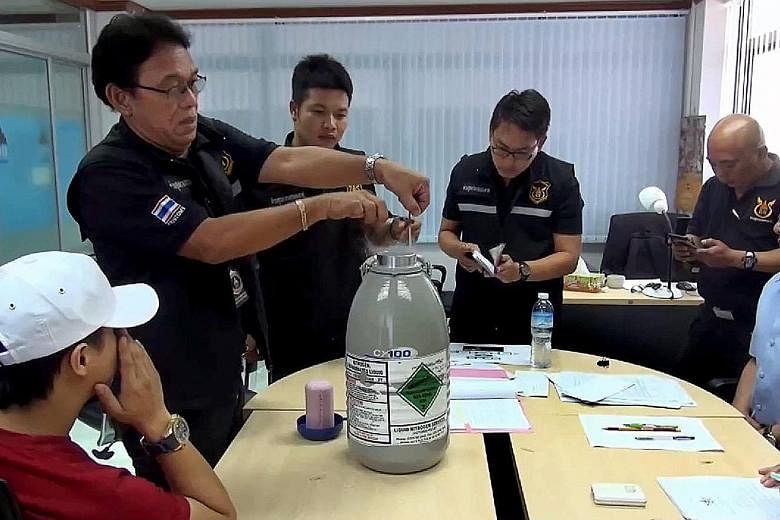The recent arrest of a man for attempting to transport human sperm from Thailand to Laos has cast a spotlight on cross-border surrogacy arrangements designed to get around bans by individual countries in the region.
With bans on commercial surrogacy in Thailand, Cambodia and Vietnam driving the rent-a-womb industry underground, more surrogate mothers are now implanted with embryos in Laos, where there are no laws governing the practice. These surrogates then deliver their babies in a separate country.
On April 20, Thai Customs officers in the border province of Nong Khai stopped 25-year-old Nithinon Srithaniyanan from carrying six vials of semen into Laos.
The semen - reportedly from a Chinese man and a Vietnamese man - was frozen inside a nitrogen tank.
Nithinon later said he had taken semen to a clinic in Laos 12 times, as well as to another clinic and hospital in Cambodia 13 times since last year, making 5,000 baht (S$202) for each run, according to the local press.
-
1,000
Number of babies born to surrogate mothers each year in Thailand until Bangkok clamped down on the practice in 2014.
110
Number of commercial surrogacy arrangements approved by the authorities in 12 months in Thailand after a law banning commercial surrogacy was enacted in 2015.
Under a Thai law introduced in 2015, those who trade, import or export sperm, eggs and embryo can be fined and jailed for up to three years.
The penalties were introduced after back-to-back scandals in 2014 involving foreigners who had hired Thai women as surrogate mothers.
In a surrogacy arrangement, an embryo - formed from the sperm and/or egg of the intended parents - is implanted in the womb of a surrogate mother, who then carries the child to term. The baby, once born, is then returned to the biological parents.
Critics warn, however, that surrogate mothers in unregulated environments - while earning higher than average wages in their country during pregnancy - are vulnerable to exploitation. While countries such as Thailand and Vietnam allow only "altruistic" surrogacies, it is hard to police what is paid to the often poor young women who sign up to have other people's babies.
According to Mr Sam Everingham, the founder of Families Through Surrogacy, a non-profit group which supports people seeking children through surrogacy, at least 200 babies are born every year in South-east Asia through surrogacy arrangements.
But with the tightening legal environment in the region, "the industry has been looking for new places to do embryo transfers", he told The Straits Times.
About 1,000 babies were born to surrogate mothers each year in Thailand until Bangkok clamped down on the practice in 2014.
After a law banning commercial surrogacy was enacted in 2015, only 110 such arrangements were approved by the authorities in 12 months.
This created a surrogacy boom in neighbouring Cambodia which came to an end last year, when Phnom Penh arrested Australian nurse Tammy Davis-Charles, who ran a surrogacy operation there.
The sudden ban drove pregnant Cambodian surrogate mothers underground and left at least 10 Australian couples in limbo, unable to take their babies home. Earlier this month, Cambodia issued guidelines for foreign parents to leave the country with babies who had been born or were about to be born through surrogates.
The Cambodian ban in turn swelled surrogacy operations in the Laotian capital Vientiane, which is just about an hour's flight away from modern health facilities in Bangkok.
Typically, surrogates are impregnated in Laos but give birth in Thailand or other countries. Mr Everingham said these services have been popular among prospective parents, including those from Australia and China.
Communist-ruled Laos, like Cambodia, is one of the poorest countries in Asean. While it has no laws dealing with surrogacy, some agencies have expressed concerns that Vientiane may clamp down on the practice without warning.
"While the government may not crack down for several months... the movement by the government is likely to be swift and comprehensive," noted Sensible Surrogacy, an agency based in Las Vegas, on its website.
In response to the recent alleged sperm smuggling case, a senior Laotian health official said the government was carrying out its own investigation. But Dr Chanphomma Vongsamphan, the director-general of the Ministry of Health's healthcare department, also told the Vientiane Times that there was no clinic in Laos licensed to offer surrogacy services.
In Thailand, a Straits Times search on social media revealed that surrogacy arrangements continue on the quiet. The popular Web-board Pantip.com posted an open call for surrogates that continues to draw the interest of women who state their requested fees upfront.
"Interested in being a surrogate mother," one post in February said. "Has one child. Lives in Nonthaburi (province). Age 23. No job. Would like to be paid 450,000 baht upwards."
When The Straits Times posed as a potential client and contacted her via the Line mobile chat app last Tuesday, she revealed that she was already three months pregnant and awaiting a 500,000 baht payment.

